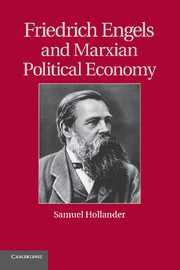Book contents
- Frontmatter
- Contents
- Preface
- Prolegomena
- 1 Engels's Early Contribution
- 2 The Surplus-Value Doctrine, Rodbertus's Charge of Plagiarism, and the Transformation
- 3 Economic Organization, and the Price Mechanism
- 4 “Revisionism” I. Constitutional Reform versus Revolution
- 5 “Revisionism” II. Social Reform
- 6 The Engels–Marx Relation
- 7 A Methodological Overview
- Epilogue: The Immediate Legacy
- Appendix A Prolegomena: A Brief Chronology
- Appendix B Chapter 5
- Appendix C Chapter 7
- Bibliography of Works Cited
- Index
- Titles in the series
Prolegomena
Published online by Cambridge University Press: 01 June 2011
- Frontmatter
- Contents
- Preface
- Prolegomena
- 1 Engels's Early Contribution
- 2 The Surplus-Value Doctrine, Rodbertus's Charge of Plagiarism, and the Transformation
- 3 Economic Organization, and the Price Mechanism
- 4 “Revisionism” I. Constitutional Reform versus Revolution
- 5 “Revisionism” II. Social Reform
- 6 The Engels–Marx Relation
- 7 A Methodological Overview
- Epilogue: The Immediate Legacy
- Appendix A Prolegomena: A Brief Chronology
- Appendix B Chapter 5
- Appendix C Chapter 7
- Bibliography of Works Cited
- Index
- Titles in the series
Summary
Some Ground Clearing
Gareth Stedman Jones refers to the “one-sidedness of most modern treatments of Engels. … For, from at least the end of World War I, assessment of Engels's particular contribution to Marxism had become a highly charged political question. After a period of unrivalled prestige, between the 1880s and 1914, Engels's reputation suffered first in the revolutionary leftish critique of the failings of the Second International and subsequently in the non-communist or anti-communist critique of the excesses of the Third” (1982: 290–1). Kircz and Löwy have phrased the state of affairs with felicity:
Too often we have seen attempts to create a kind of Holy Duality with semi-religious connotations. This type of hagiography, typical of the tradition of the Second and especially the Third International, not only hampers the proper understanding of the dynamics and historical role of the two friends, but also blocks the continuation and expansion of the program they started. As a reaction to this attitude we also encounter numerous attempts to artificially separate the two men, mostly with the objective of promoting Marx to the position of universal (and therefore politically neutralized) thinker and to degrade Engels to the position of an operationalist schema-builder and moral founder of social-democratic degeneration and the Stalinist nightmare. (1998: 5)
- Type
- Chapter
- Information
- Friedrich Engels and Marxian Political Economy , pp. 1 - 24Publisher: Cambridge University PressPrint publication year: 2011



